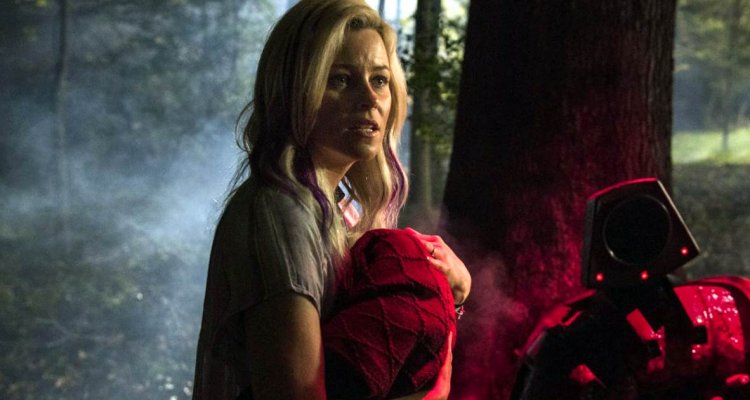Originally announced as an “untitled James Gunn horror project,” shrouded in mystery, and then finding itself caught in the crosshairs of the filmmaker’s controversial firing from the upcoming “Guardians of the Galaxy Vol. 3” by Disney (since re-hired), the dark, deconstructive superhero film, “Brightburn” has been through the wringer on its way to the screen. Actually directed by frequent Gunn family collaborator David Yarovesky (“The Hive”), it’s a shame all this baggage hangs over “Brightburn” because the film is a gem, especially for anyone yearning for a superhero film that gleefully torches the familiar “good versus evil” formula and introduces far more sinister sensibilities.
READ MORE: the 100 Most Anticipated Films Of 2019
Written by Gunn’s brother, Brian Gunn, and cousin, Mark Gunn, ”Brightburn” delivers an old school pitch-black comedy-horror film—yes, heavily indebted to the James Gunn style— and simultaneously, a welcome “fuck you” to the superhero genre, the American way, and the twisted politics of the Hollywood blockbuster machine. The goriest mainstream horror film of the past two years (sorry, “Halloween,” deepest sympathies, “Suspiria,” take a seat, “Hereditary“), “Brightburn” maximizes its $7 million budget’s full potential, equally exhibiting authentic chills and reluctant laughs, to craft a new philosophy apropos of the tired, black and white moral constructs of the superhero genre.
READ MORE: Summer Movie Preview: 35 Films You Shouldn’t Miss
And it’s very much of a purposeful riff that immolates and plays with the Superman mythos as the marketing has already suggested. Martha and Jonathan Kent stand-ins, Tori (Elizabeth Banks) and Kyle Breyer (David Denman), live in the Smallville analog, Brightburn, Kansas. There’s a Clark Kent surrogate, Brandon Breyer (Jackson A. Dunn), and even a Lois Lane proxy, Caitlyn (Emmie Hunter). A clear-cut Man of Steel origin story transpires until Brandon, quite literally, follows his cryptic dreams to carry out a horrifying plan that may or may not include omnicide. It’s obvious why the Gunn family set the story in Kansas. It’s the same setting where “Superman” takes place, yes, but it’s also the heart of Middle America, where traditional family values, community, church over state, conservative politics, patriotism, and some of the most extreme forms of hypocrisy thrive in the United States. Outdated ideals and people the collective Gunns are itching to roast.
READ MORE: Summer Movie Preview: 35 Films You Shouldn’t Miss
Kansas is the perfect place to fundamentally upheave the increasingly obsolete American way of thinking (which Caitlyn’s essay, “The Decline of Truth and Justice in the Modern World,” cheekily pokes fun at)— that the rest of the world serves our interests. That freedom is a fundamental truth worth desecrating countries for, not a propagandistic conceit our government feeds to its employees, citizens, and military in order to further the U.S.’s economic power. That the U.S. is an entirely selfless, eleemosynary, and benevolent country fighting to keep us safe, not an imperial hegemon suppressing any movement that would challenge the post-Cold War order in a unipolar world. Brandon’s destruction is an allegory for America’s true colors: blood red, oppressively white, and corporate blue. If the U.S. is the superpower in this unipolar world, then Brandon, the only entity more powerful than the U.S., represents centuries of the shocking abuse of its power at home and abroad, giving us a taste of our own medicine, so to speak.
READ MORE: 2019 Cannes Film Festival: The 21 Most Anticipated Movies
There is no “why,” however, for better or worse. “Brightburn” doesn’t need to explain why Brandon does what he does. He is an alien from a different solar system. How could we expect him to have the same moral compass as us? “Good versus evil” isn’t just a dated superhero genre trope, it’s still a reverie many of us blindly adhere to in the real world. It wouldn’t be fair to call Brandon evil. If Brandon is evil, so is the U.S. He has completely different genetic makeup than human beings, different brain chemistry, different ideas of morality, and, since he is fundamentally not human, doesn’t value human life as our species does. Brandon’s carnage is a benign evil, a moral grey area in the larger context of the story, if one must see it through the lens of “good versus evil.” For Tori to believe that Brandon is a blessing sent to the Breyers, destined to protect the world and serve America like Superman, is a naive notion better suited for a more fanciful mythological story.
As mentioned, the Gunns and Yarovesky don’t lift their feet off of the proverbial gas pedal in the gore department. “Brightburn” is a welcome harkening back to Gunn’s savagely violent (“Dawn of the Dead,” screenwriter), over-the-top, gory horror-comedy (“Slither,” writer, director), Vantablack comedy superhero indie (“Super,” writer, director), and horror-satire (“The Belko Experiment,” screenwriter) roots, drawing inspiration from and paying homage to the director’s filmography. It’s smarter than it looks, its characters intentionally dumbed down, its production value exceptional; Yarovesky and composer Tim Williams beautifully emulate specific Zack Snyder shots and Hans Zimmer motifs from “Man of Steel” on merely 3% of the blockbuster’s bloated budget. This genre antithesis screams of intelligent rebelliouness with clever, stylistic flourishes to boot. [B+]
”Brightburn” hits theaters on May 24.

